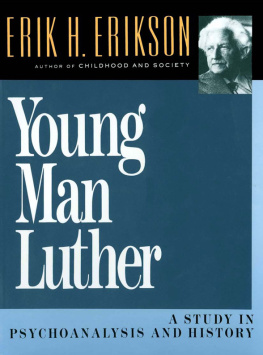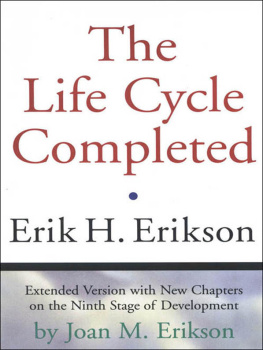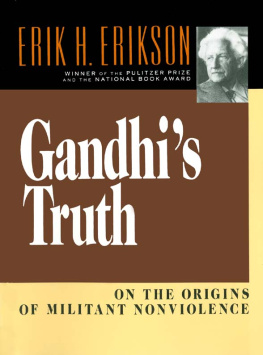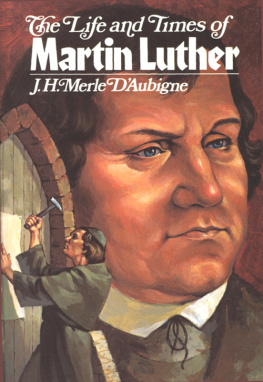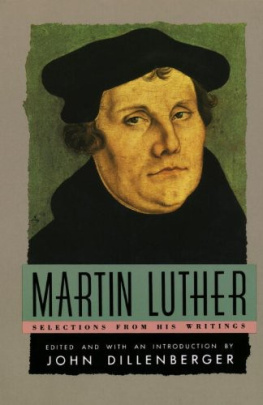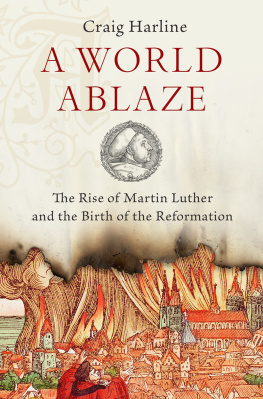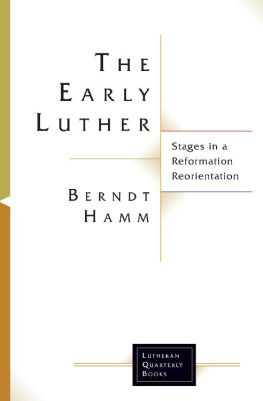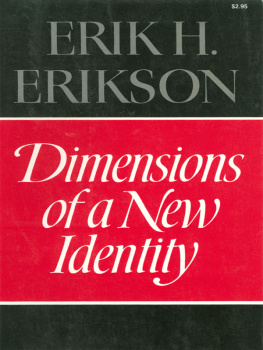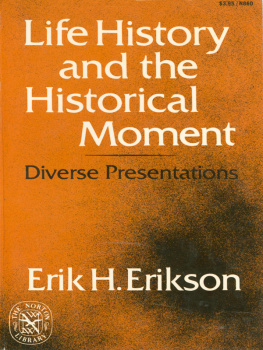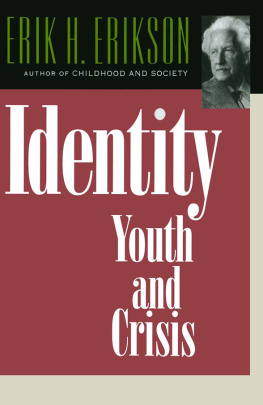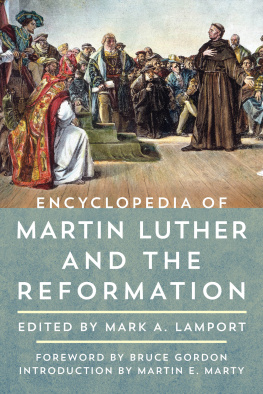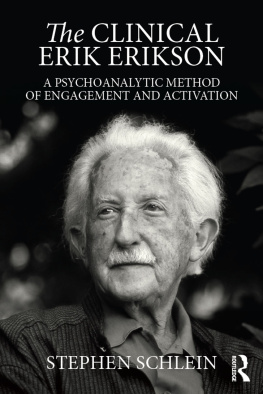These standard works on and by Luther will be referred to by the following abbreviations:
Dok. | = Otto Scheel, Dokumente zu Luthers Entwicklung (Tuebingen, J.C. B. Mohr, 1929). |
Enders | = E. L. Enders, Martin Luthers Briefwechsel (Frankfurt, 18841907). |
L.W.W.A. | = Martin Luther, Werke (Weimarer Ausgabe, 1883). |
Reiter | = Paul J. Reiter, Martin Luthers Umwelt, Charakter und Psychose (Kopenhagen, Leven & Munksgaard, 1937). |
Scheel | = Otto Scheel, Martin Luther: Vom Katholizismus zur Reformation (Tuebingen, J. C. B. Mohr, 1917). |
TR | = Luthers Tischreden (Weimarer Ausgaben). |
PREFACE
1. Anna Freud, The Ego and the Mechanisms of Defence, translated from the German by Cecil Baines (New York, International Universities Press, 1946).
2. August Aichhorn, Wayward Youth, with a foreword by Sigmund Freud (New York, Viking Press, 1935).
3. Heinz Hartmann, Ego Psychology and the Problem of Adaptation, translated by David Rapaport (New York, International Universities Press, 1958). Also, Notes on the Reality Principle, The Psychoanalytic Study of the Child, XI (New York, International Universities Press, 1956), 3153.
4. David Rapaport, Some Metapsychological Considerations Concerning Activity and Passivity, unpublished paper, 1953. Also, The Theory of Ego Autonomy: A Generalization, Bulletin of the Menninger Clinic, 22 (1958), 1335.
5. E. H. Erikson, The Problem of Ego Identity, Journal of the American Psychoanalytic Association, 4 (1956), 56121. I have presented some applica tions of the identity concept to study groups; see Totalitarianism, ed. by Carl J. Friedrich (Cambridge, Harvard University Press, 1954), 156171; New Perspectives for Research on Juvenile Delinquency (Washington, D.C., Childrens Bureau, U.S. Department of Health, Education and Welfare, 1956), 123; and Discussions on Child Development, Proceedings of the Third Meeting of the Child Study Group, World Health Organization (London, Tavistock Publications, Ltd., 1956).
6. E. H. Erikson, The First Psychoanalyst, Yale Review, XLVI (1956).
7. E. H. Erikson, Freuds Psychoanalytische Krise, Freud in der Gegenwart (Frankfurt, Europaeische Verlagsanstalt, 1957).
CHAPTER I
1. Soeren Kierkegaards efterladte Papirer, ed. P. A. Heiberg (Cophenhagen, 1926), IX, 75. Cf. Eduard Geismar, Wie urteilte Kierkegaard ueber Luther? Luther-Jahrbuch X (1928), 18.
2. R. G. Collingwood, The Idea of History (New York, Oxford University Press, 1956), 22627.
3. Ref. I, Preface.
4. Ibid., 177.
5. Heinz Hartmann, Ego Psychology and the Problem of Adaptation.
6. E. H. Erikson, On the Nature of Clinical Evidence, Evidence and Inference, The First Hayden Colloquium (Cambridge, The Technology Press of M.I.T., 1958); also, Daedalus, Journal of the American Academy of Arts and Sciences Proceedings, 87 (Fall, 1958).
7. Sigmund Freud, New Introductory Lectures on Psychoanalysis, translated by W. T. H. Sprott (New York, W. W. Norton & Co., 1933).
8. Sigmund Freud, The Future of an Illusion, translated by W. D. Robson-Scott (New York, Liveright Publishing Corp., 1949).
9. Karl Mannheim, Utopia and Ideology (New York, Harcourt Brace, 1949).
CHAPTER II
1. Scheel, II, 116.
2. Dok., No. 533.
3. Dok., No. 533.
4. Johannes Cochlaeus, Commentaria de actis et scriptis Martini Lutheri (Mainz, 1549).
5. Scheel, II, 117.
6. Dok., No. 533.
7. P. Heinrich Denifle, Luther in Rationalistischer und Christlicher Beleuchtung (Mainz, Kirchheim & Co., 1904), p. 31.
8. Reiter, II, 99.
9. Reiter, II, 556.
10. Reiter, II, 240.
11. Preserved Smith, The Life and Letters of Martin Luther (New York, Houghton Mifflin & Co., 1911).
12. Preserved Smith, Luthers Correspondence (Philadelphia, The Lutheran Publication Society, 1913).
13. Preserved Smith, Luthers Early Development in the Light of Psycho-analysis, American Journal of Psychology, XXIV (1913).
14. Ibid., 362.
15. Dok., No. 199.
16. L.W.WA., XXXIII, 507.
17. Scheel, I, 261.
18. Heinrich Boehmer, Road to Reformation (Philadelpia, Muhlenberg Press, 1946).
19. Leopold von Ranke, History of the Reformation in Germany (London, 1905).
20. Theodosius Harnack, Luthers Theologie I (1862); II (1886).
21. Hartmann Grisar, Luther (Freiburg, Herder Verlag, 1911).
22. Lucien Febvre, Martin Luther, A Destiny (London, J. M. Dent & Sons, Ltd., 1930), 18.
23. Denifle, Ref. 7, 77.
24. P. Heinrich Denifle, Luther und Luthertum in der ersten Entwicklung (Mainz, Kirchheim & Co., 1906), I, 77475.
25. Ibid.
26. Reiter, II, 121.
27. R. Pascal, The Social Basis of the German Reformation (London, Watts & Co., 1933), 227.
28. Ernst Troeltsch, The Social Teaching of the Christian Churches (London, 1931).
29. Max Weber, The Protestant Ethic and the Spirit of Capitalism (London, 1948).
30. R. H. Tawney, Religion and the Rise of Capitalism (New York, Harcourt, Brace and Co., 1952).
31. Quoted in Heinrich Bornkamm, Luther im Spiegel der deutschen Geistes-geschichte (Heidelberg, Quelle und Meyer, 1955), 191.
32. Dok., No. 209.
33. Dok., No. 248.
34. Quoted in Bornkamm, Ref. 31, 330.
35. William James, Varieties of Religious Experience (Longmans, Green and Co., 1935), 199.
36. E. H. Erikson, The Problem of Ego Identity, Journal of the American Psychoanalytic Association, 4 (1956), 56121.
37. G. B. Shaw, Preface to Selected Prose (New York, Dodd, Mead and Co., 1952).
38. E. H. Erikson, The First Psychoanalyst, Yale Review, XLVI (1956), 43.
39. Sigmund Freud, The Interpretation of Dreams, Complete Psychological Works of Sigmund Freud, Volumes IV and V (London, Hogarth Press, 1953).
40. L.W.W.A., VII, 838.
CHAPTER III
1. L.W.W.A., VIII, 57475.
2. L.W.W.A., VIII, 575.
3. R. H. Tawney, Religion and the Rise of Capitalism, 68.
4. Martin Luther, Werke (Erlanger Ausgabe), LIX, 324.
5. Julius Koestlin, Martin Luther, Sein Leben und seine Schriften (Berlin, Alexander Duncker, 1903), I, 48.
6. Reiter, I, 362.
7. Roland H. Bainton, Here I Stand (New York, Abingdon-Cokesbury Press, 1930), 23.
8. TR, II, No. 1559; Cf. Scheel, I, 11.
9. See the chapter on two American Indian Tribes in Childhood and Society.
10. Scheel, I, 20. Dok., Nos. 406 and 430.
11. Luthers Werke (Erlanger Ausgabe), XL, 164.
12. Dok., No. 417.
13. L.W.W.A., XXXVIII, 338.
14. Reiter, I, 362.
15. Huizinga, The Waning of the Middle Ages (New York, Doubleday, 1956), 150.
16. Ibid., 138.
17. Ibid.
18. L.W.W.A., XXXVIII, 105.
19. Scheel, I, 229.
20. TR, IV, No. 4714.
21. TR, IV, No. 5024.
22. Scheel, I, 15074.
23. L.W.W.A., VIII, 573.
24. L.W.W.A., VIII, 57374.
25. TR, IV, No. 4707.
26. Dok., No. 175.
27. Ernst Kris, Psychoanalytic Explorations in Art, Chapter 13, On Inspiration (New York, International Universities Press, 1952), 291302.

